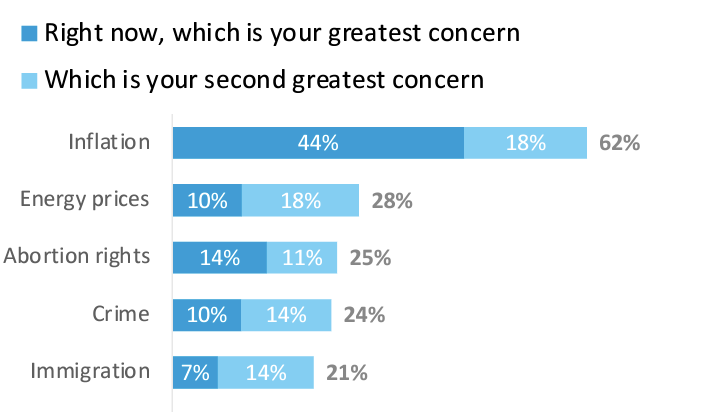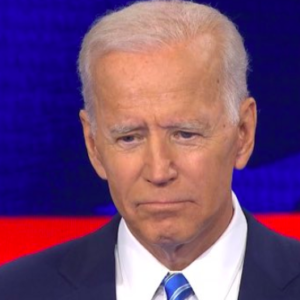A stack of new polls dropped after Independence Day, and they hit Democrats’ hopes for the midterms like a bombshell. By nearly every metric—including polling on abortion—President Joe Biden, his party, and its policies are under the political gun.
The data are from the Harvard/Harris poll, the Monmouth poll, and YouGov, all of which are considered mainstream—if not left-leaning—sources. A quick overview of how voters feel about the condition of their nation after almost 18 months of Democratic governance:
88 percent of Americans believe the nation is heading in the wrong direction.
57 percent believe the federal government is making things worse on the most important issues.
54 percent say the middle class isn’t benefiting from Biden administration policies.
60 percent say Biden isn’t mentally fit for the job of president.
64 percent say Biden is too old to be president.
The Monmouth poll finding just 10 percent of voters believe the country is on the right track is the lowest number ever recorded since the pollster began asking the question in 2013. And more bad news: 68 percent of respondents to the YouGov poll said they believe the economy is getting worse—the highest percentage since at least 2009.
On the issues, Democrats are also in a tough spot. Their focus is on abortion, guns, and January 6. According to Monmouth, however, voters rank the issues in order of importance like this:
33% inflation
15% gas prices
9% economy
6% bills/groceries
5% abortion
3% guns
Biden’s approval on the top four issues is at or below 30 percent.
In the Harvard/Harris poll, four of the top five issues are all strong for the GOP:

Guns, Trump, and social justice are down in the low single digits. Even if Democrats make progress pushing those issues, they do not have the impact to move nearly as many voters as the Republicans’ issues do. Is it any wonder GOP-allied groups are running ads targeting vulnerable U.S. Senate Democrats like Sens. Catherine Cortez Masto (Nev.) and Maggie Hassan (N.H.) on the cost of living.
And then there’s abortion. Polls have consistently shown the U.S. Supreme Court’s Dobbs decision has highlighted the issue since the draft of the ruling first leaked last spring. Since the actual decision was released, the temperature has clicked up even higher. And yet it still can’t compete with inflation and energy prices as a priority.
But even if it could, the Harvard/Harris poll shows what virtually every poll in the past year has: Democrats are far out of touch with most voters on abortion policy. Note that these responses were from after the Dobbs decision was announced:
On overturning Roe: 45 percent support/55 percent oppose.
On banning all abortion, with exceptions for rape and incest: 37 percent support.
On banning abortions (with exceptions) after six weeks: 49 percent support.
On banning abortions (with exceptions) after 15 weeks: 72 percent support. And that includes 60 percent of Democrats.
In other words, only a small percentage of the political fringe supports the abortion-without-restriction policy that Democrats in the U.S. House and Senate have already voted for in the so-called “Women’s Health Protection Act.”
Is the Roe decision impacting voter behavior? No surprise that Republicans and Democrats both say they are more motivated to vote by it—although from opposite sides of the issue.
And what about independent or unaffiliated voters? Yes; 25 percent say they are more likely to vote Democrat and 27 percent say they are more likely to vote Republican because of the Dobbs ruling.
“All of the activists in the twitterverse should take note – kitchen table issues continue to dominate the concerns of voters,” said Dr. Wayne Lesperance, Professor of Political Science at New England College. “All the emphasis on SCOTUS decisions, however impactful, are not resonating with voters. The cost of everything without obvious relief is on the minds of voters.”
Even the attacks on the Supreme Court aren’t working. A majority of independents (58 percent) and Democrats (54 percent) say the court is “legitimate,” and 66 percent of Democrats say it is wrong to attack the court as illegitimate.
Meanwhile, the most important number for predicting a party’s performance in the midterms is the president’s approval rating. Biden’s at the lowest point of any president at this point in his term, with a net approval of -18.5 percent in the RealClearPolitics average. And because Americans already have questions about his ability to serve—a majority believe he’s unfit—every misstep in the next four months is going to move that number lower.
The last time a president was this low in the polls for a misterm was never.
“On July 8, 1978, Jimmy Carter’s job approval numbers were 40 positive, 41 negative, 19 no opinion,” notes Lesperance. “Those numbers are better than Joe Biden’s current numbers. While Joe Biden has not yet given a ‘malaise’ speech. Malaise was used to describe the mood of voters at that time.
“It seems to me that malaise is back and respondents are fixing blame on the president.”

